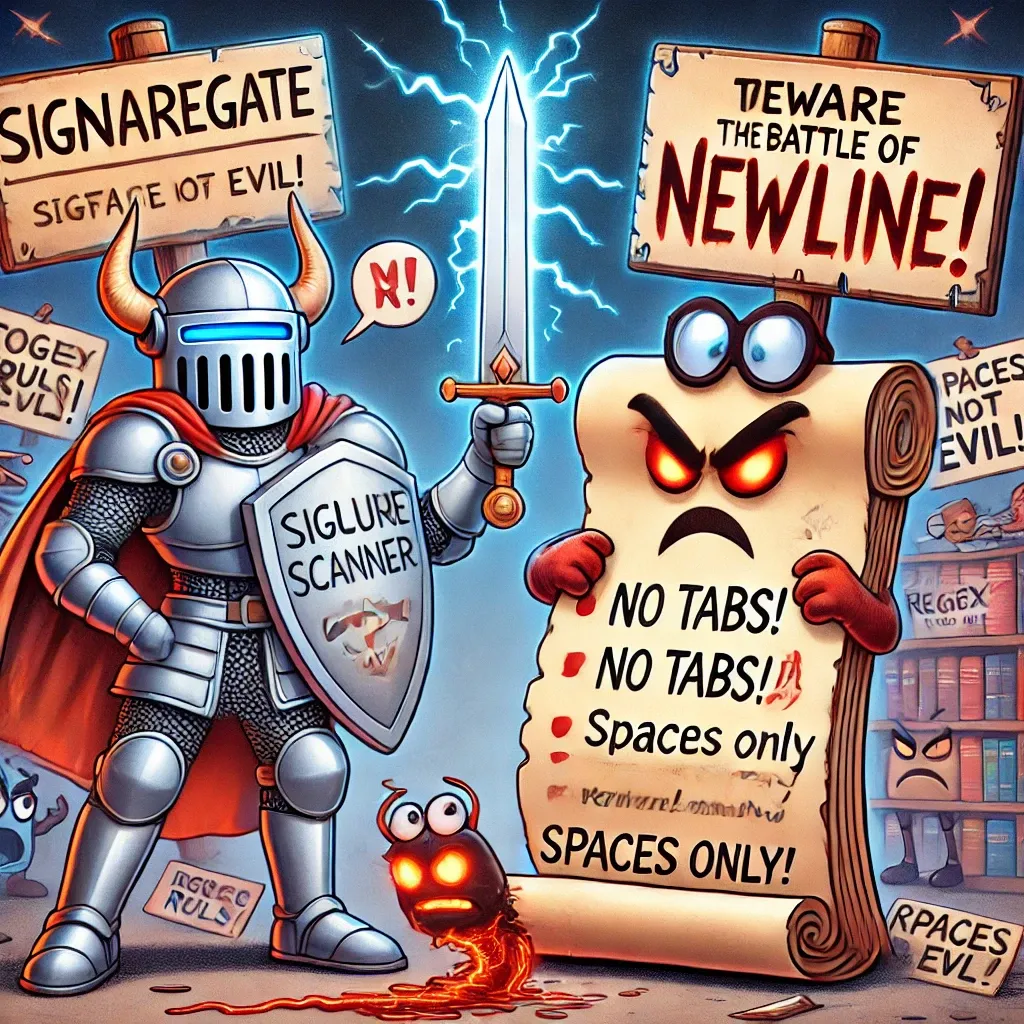Hackers Love a Good Signature—The Tale of Nuclei’s Wobbly Line Breaks

Imagine this: You’re a dedicated member of the security community, cradling your trusty open-source vulnerability scanner, Nuclei, as if it’s the Holy Grail of keeping your servers safe. You feel secure, invincible even, armed with its 21,000 GitHub stars and over 2 million downloads. But then, out of the shadows comes a chilling whisper: “newline handling discrepancies.”
Yes, you heard that right. Our beloved Nuclei, champion of detecting vulnerabilities, has a high-severity security flaw—because it apparently has trouble reading the room when it comes to newlines. If this doesn’t sound terrifying yet, let me paint the picture.
The Plot Thickens: CVE-2024-43405 (or as we like to call it, “Signaturegate”)
Discovered by the Wiz engineering team (presumably while sipping coffee and muttering, “What fresh hell is this?”), the vulnerability is as deviously simple as it is maddeningly complex. It’s like the vulnerability equivalent of putting a “Kick Me” sign on someone’s back—only this sign lets attackers bypass signature checks and execute malicious code.
Here’s how it works, in non-technical terms: Imagine you have a librarian (Nuclei) who swears she only checks out books with a proper signature. But due to some confusion over punctuation (curse you, newline discrepancies!), she ends up approving books with “Totally Not Evil” scribbled on the cover, blissfully unaware of the actual malware lurking inside.
YAML, Regex, and the Clash of Titans
To unravel this, you need to understand that Nuclei’s strength lies in its flexible YAML templates, which are fantastic for detecting vulnerabilities—until they’re not. YAML, for the uninitiated, is a configuration format best described as “fussy.” It hates tabs, loves spaces, and apparently has strong opinions about how newline characters should behave.
But here’s the kicker: Nuclei’s signature verification system uses regex (a tool that loves to overcomplicate simple tasks) to validate these templates. Unfortunately, regex and YAML do not agree on what constitutes a line. Regex says, “Ah, this line looks fine.” YAML mutters, “Nope, that’s two lines,” and poof—malicious code slips through like a cat sneaking under a door.
A Recipe for Disaster
How exactly does this work? Let’s break it down:
- The Rogue Carriage Return: Attackers exploit inconsistencies in how Nuclei handles the sneaky
\rcharacter. Regex thinks it’s part of a line; YAML says it’s a new one. Cue chaos. - First Come, First Trusted: Nuclei only verifies the first signature line, blissfully ignoring any others. This is like checking the ID of the first guest at a party and assuming everyone else is their twin.
- Selective Amnesia: During validation, Nuclei removes all
# digest:lines from the content—except the malicious bits tucked neatly between them.
With these ingredients, attackers can bake a lovely exploit pie, injecting malicious templates that can compromise systems faster than you can say “open-source irony.”
Who’s Affected?
If you’re running a version of Nuclei later than 3.0.0, congratulations! You’re officially vulnerable. The fix arrived in version 3.3.2, but if you haven’t updated yet, you might as well leave your front door open with a neon sign that says, “Hackers Welcome.”
Why Should You Care?
Nuclei isn’t just any vulnerability scanner. It’s a darling of the security community—a Swiss Army knife for finding weaknesses in systems. But its very flexibility makes it a double-edged sword. With its code protocol, Nuclei can execute external code on the host system. This is great if you’re scanning for vulnerabilities. Less so if you’re an unwitting accomplice to executing malicious payloads.
And don’t even get me started on community-contributed templates. Sure, crowdsourcing is cool—until it’s not. The advisory warns that untrusted templates could lead to arbitrary command execution, data theft, or system compromise. In short: things you definitely don’t want happening on your watch.
The Moral of the Story?
- Patch, Patch, Patch: Update to v3.3.2. Do not pass Go. Do not collect $200.
- Trust But Verify: And by verify, I mean actually verify. Relying solely on a signature check that can be bypassed by rogue
\rcharacters? That’s like trusting a bouncer who gets fooled by a fake mustache. - Beware the YAML Parser: If you’re dealing with YAML, remember: it’s a grumpy old man who doesn’t care about your regex rules.
In conclusion, while Nuclei may have stumbled over something as seemingly trivial as newlines, it’s a reminder to all of us in the tech world: The devil is in the details. Or, in this case, the \r.
Comments ()